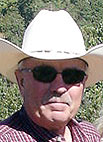
Quarter horses, some Appaloosas, Long Horn cows, polled Charolais bulls, chickens, dogs and grandkids: You’ll find them all on Leroy and Sharon Uber’s farm in Stone County. They were honored in August at the Missouri State Fair as the 2009 Stone County Farm Family.
Leroy has been in the saddle and raising cattle for more than 40 years, nearly 30 of them on the property southwest of Nixa. They own 200 acres and rent another 400. One son helps with the farm while another son runs cattle of his own elsewhere.
“Oh, farming’s definitely in my blood, and I have a terrible addiction to horses,” Leroy said, joking that Sharon has suggested they wouldn’t have to work so hard if they didn’t have so many horses. Leroy grew up on a traditional farm with dairy cows, chickens, pigs and, of course, horses. His father and grandfathers were all good horsemen. One grandfather was a bronc buster in World War I. Otherwise, the barely broke horses “may have killed more soldiers than the enemy,” Leroy laughed.
Of the Ubers’ 22 horses, about 10 are used to round up 140 momma cows and 100 yearlings – “You’ve got to have horses to move Longhorns,” Leroy pointed out – or the horses are used for roping and team sorting and penning. The other horses are used for breeding.
Leroy competes in about 15 team penning and sorting events a year. And he’s been successful, having won his third Bayer Select World AQHA Championship in team penning in 2006, thanks to “two good partners and one good horse,” his mare, GM Freckled Annie.
On the cattle side of the farm, Leroy used to raise calves as rodeo roping stock. But because of the poor market, he’s making the switch to commercial grade beef. His Longhorns, weighing 900-1,100 pounds, feed on fescue, clover, lespedeza and bermuda and winter on grass and hay. The cows, bred to a polled Charolais bull, calve in spring and fall, with steers selling in the high 500 pounds and heifers in the low 500s. Eventually, the heifers he saves will be bred to Limousin or black Angus bulls.
“We should have pretty good hybrid vigor,” he said. “We should avoid too many calving problems by selecting low birthweight bulls.”
Like many farmers, Leroy has found it takes more than the farm to pay the bills. For 30 years, he’s also owned James River Lawn and Landscaping. Sons Matt and Chad also have their own landscaping businesses.
“In today’s world, I’m not sure anyone on a small scale can make a living on the farm, but that doesn’t mean they can’t enjoy the lifestyle if they’re willing to sacrifice other things,” said Leroy.
He admits that agriculture has a lot of problems, and farmers themselves haven’t helped. “Us ag people have done a poor job of educating the public about what we do. They think their steak comes from the store, and they don’t know about the farmer going out in freezing weather at 2 a.m. to save a newborn baby calf,” he said.
With the price of both cattle and horses so low, why does Leroy continue to farm? “I wanted my kids and grandkids to see what (the farm life’s) about. I enjoy it thoroughly. Sure, there are some bad days like when a cow lays down and dies, but that’s just part of it. We get to watch beautiful sunsets and see a big starry sky at night,” he said.







